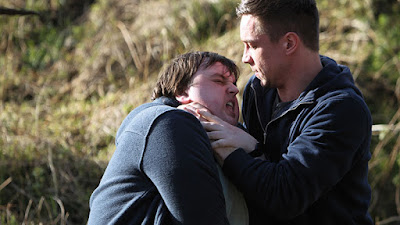CIFF40: Traders (2015)
From its noirish, Trainspotting-esque narration at the start to its blatant stylistic lifts from Danny Boyle, Guy Ritchie, Quentin Tarantino, and Office Space, the first 25 minutes or so of Traders felt like a signal beamed from outer space in 1996, but only just reaching us now. Twenty years ago it would've been the Hot New Thing, but now it just felt warmed-over.
Centering on two financial analysts who design a winner-take-all game of murder when their firm goes belly-up, the early moments of Traders were interesting but flat, a recuperation of turn-of-the-millennium laddishness that wanted to filter the politics of global financial meltdown through violent genre play. Harry (Cillian Scott), our central anti-hero, even looked like Brad Pitt, circa Fight Club. Like its two leads, it seemed willing to take the "stakes" of other films and filmmakers as its own, at any cost (within this game of borrowing and bricolage, my favorite lift was the thick, atonal synthesizer chords that felt borrowed from an '80s Cannon film). "There are decisions in life you know you'll come to regret," mutters Harry, the anti-hero narrator of Traders (2015), and as the CIFF40 animated introduction (with its pleasant little earworm of a bluegrass song by local Cleveland band Honeybucket) faded into Rachael Moriarty and Peter Murphy's feature, and I sunk deeper into my seat, I began to dread that Harry was right.
"But then again...," Harry says at several points, and it's an important point to remember as a movie unfolds. Suddenly, after Harry has his first, disastrous "trade" (i.e., fighting) encounter with his business partner Vernon (John Bradley, all sinister baby fat, like Charles Laughton), and the latter is laid up wounded in bed, there's a turn: Orla (Nicki McGuigan), the object of Vernon's un-returned affections, shows up in response to a phone call from Harry, who really just wants Vernon out of his apartment. There's a funny exchange between the three, with Vernon's weaponized blend of childishness and sharp-edged entitlement jostling against Nicki's dry cynicism and Harry's exhaustion. The scene began to suggest there was something smarter and more complex bubbling underneath all of Traders' neo-mod signifiers and cinematic borrowing.
This was confirmed by the second "trade" of the movie, a brilliantly staged burst of violent energy, full of well-deployed hand-held shots, quick cuts, and harsh sound effects at increased volume, all of which brought out the terror and explicitness of the fight. Like the whiplash chain that Harry's "trading partner" sneaks into the battle, the confidence and raw terror of the scene's staging refocused my eye and energy, and I began to see how well the movie was sneaking smart details of ritual and resonant, critical puns into its jus' blokes structure. From the wide-angled faces (suggesting Kubrick or Ken Russell) that slowly distort Harry's handsome features, to the flat light and off-white/yellow backgrounds that make his skin even more pallid; from the overcast gray of the Dublin sky and the use of landscapes as grimy funeral pits, to the fake horror-movie blood that spurts from lips and limbs, to the frozen edamame bags that Harry wryly stuffs his winnings into; from the twin blue hoodies of Harry and Vernon that visually link them even as they pull away in disgust from one another, to the green anorak Harry wears to "trading meetings," like Phil Daniels' devolved heir-- there's an interesting tension throughout the last two-thirds of the film between reinforcing and critiquing lad culture, and the wider codes of masculinity that feed it. "Trading" as a kind of addiction for those in both the fighting and the financial markets (and the "coding" that underlies both), as well as puns on "rough trade" as a gender metaphor, give the film's stylistic borrowing a stronger spine. That doesn't mean it's perfect-- the gangster turn toward the movie's end feels somehow both predictable and forced, I never really liked Harry's narration, and the movie's open-endedness here feels like a cop-out (whereas in the earlier Paulina it feels like a necessary abeyance). But by the end of Traders, I still felt like I'd been jazzed in a good way, that the signal had hit its target.





Comments